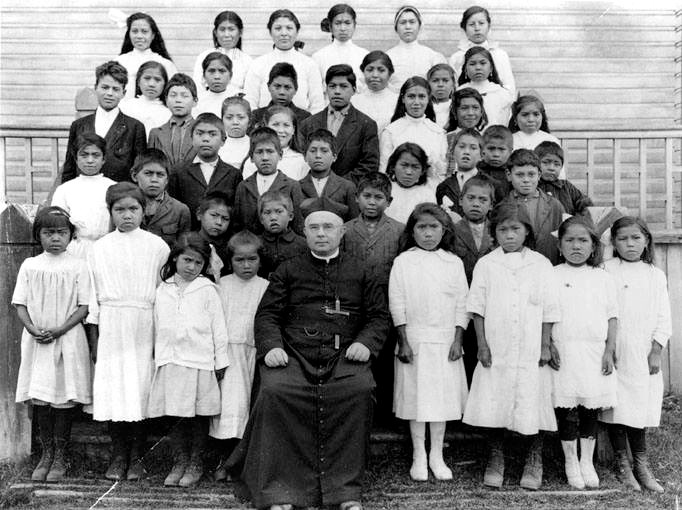A class action lawsuit filed against Canada on behalf of all First Nation day scholars and their children has been certified in Federal Court and is now moving forward.
Sechelt (shíshálh) Nation hereditary chief and councillor Garry Feschuk told members of the Sunshine Coast Regional District (SCRD) board about the certification on July 23, noting the judge who certified the lawsuit also called for a mediated settlement.
“We will try a court-ordered mediated settlement, and if that doesn’t work, we’ll go to trial,” Feschuk said.
The class action lawsuit, which was launched in 2012 by the Sechelt Nation and the Kamloops (tk’emlúps) Nation, was certified on June 3, 2015. As of Aug. 4, no appeal had been filed.
“We got a letter a couple of weeks ago, that Canada wasn’t going to appeal the certification,” Feschuk noted.
The class action seeks compensation for those who attended residential school during the day, but were allowed to return home at night (day scholars) as well as their children and all Indian Bands affected by the loss of their language or culture as a result of the schools.
It’s broken down into three categories: the day scholar class, the descendent class and the band class, Feschuk said.
Day scholars and descendents across Canada are automatically covered by the class action lawsuit; however, if they want to opt out, they must do so by Nov. 30, Feschuk said.
In the lawsuit, “descendents” are described as children of day scholars, including those who were legally or traditionally adopted.
Under the “band class,” Indian Bands across Canada that had a residential school (that housed day scholars) in or near them must opt in to the class action lawsuit by Feb. 29, 2016.
Feschuk said the Federal Court recognized a total of 140 residential schools across Canada that housed day scholars, which equates to upwards of 200 Indian Bands that could get involved in the lawsuit.
He plans to give out official notices to the Indian Bands identified once the court documents are all translated into French, which is a stipulation of the Federal Court.
“That should be finalized this week,” Feschuk told Coast Reporter Tuesday.
In addition to getting the word out to other Indian Bands, Feschuk said he and members of the Kamloops Nation will also push for a meeting with the federal government to start the mediation process.
Although an election has been called, he said, the sitting government still has an obligation to start the process.
“As part of the court order, there has to be an attempt at mediation,” Feschuk said.
“We’re hoping to meet with the leaders of the government soon to see if, based on the TRC [Truth and Reconciliation Commission] that came out in Ottawa and the 92 recommendations, if they’re focused on reconciliation and if they want to negotiate a settlement on this one rather than go to trial.”
At the July 23 SCRD meeting, Feschuk asked for a letter of support from the board urging the federal government to settle out of court.
“We’ve been talking on a one-on-one basis about support,” said SCRD board chair Garry Nohr. “Here’s one opportunity for us to prove it, and I hope you realize that when you see the vote, where the board stands.”
When the vote was called to draft a letter of support, all were in favour, with Sechelt Mayor Bruce Milne noting the letter should use the phrase “in the spirit of reconciliation.”
Find out more about the class action lawsuit at www.justicefordayscholars.com



